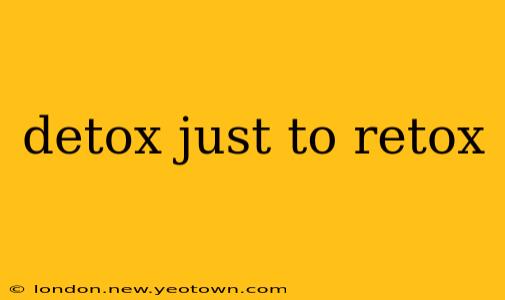We’ve all been there. The kale smoothies, the rigorous workout routines, the complete avoidance of anything remotely resembling "fun" food. Then, the inevitable happens: the celebratory pizza, the entire pint of ice cream, the weekend-long indulgence that wipes away all the hard work. This is the detox-retox cycle, a seemingly endless loop that many of us find ourselves trapped in. But is it truly a healthy lifestyle, or a path to potential harm? Let's delve deeper.
What is Detoxing? The Promise and the Reality
The term "detox" conjures images of cleansing and rejuvenation. Marketing campaigns often promise a miraculous reset, a shedding of toxins that leaves you feeling lighter, healthier, and more energetic. Many detox diets focus on eliminating specific food groups (often including processed foods, sugar, and alcohol) and often incorporate juices, smoothies, or herbal teas. While some short-term benefits like improved digestion or weight loss might be experienced, the evidence supporting long-term, significant health benefits is scant. Our bodies already have incredibly efficient systems – the liver and kidneys – designed for detoxification. These organs work tirelessly to filter out harmful substances. Unless you have specific health conditions, forcing a detox might not only be ineffective but also potentially harmful.
Why Do We Retox? The Psychology of Indulgence
The retox phase is often the more exciting part of this cycle for many. After a period of restriction and self-denial, the freedom to indulge feels liberating. The psychological aspect can't be overlooked. Deprivation often leads to cravings and overcompensation. What starts as a healthy goal can quickly morph into a cycle of restriction, intense desire, and subsequent guilt. This emotional rollercoaster isn't sustainable and can negatively impact mental health.
Is Detoxing Actually Harmful?
Can detoxing damage your body?
The answer is nuanced. While a short-term detox is unlikely to cause significant harm for healthy individuals, it's crucial to approach it with caution. Nutrient deficiencies can arise from restrictive diets, and extreme detox methods can even lead to electrolyte imbalances, dehydration, and other health issues. People with pre-existing medical conditions should always consult their doctor before undertaking any detox program. The marketing hype often surpasses the scientific evidence, leading to unrealistic expectations and potential disappointment.
What are the long-term effects of detoxing?
The long-term effects primarily stem from the yo-yo dieting aspect. Constantly restricting and then overindulging can disrupt your metabolism, making it more challenging to maintain a healthy weight. Furthermore, the emotional toll of this cycle can lead to unhealthy relationships with food, potentially contributing to eating disorders.
Are there any proven health benefits to detoxing?
Some short-term benefits, such as improved bowel movements due to increased fiber intake or weight loss from calorie restriction, might occur. However, these benefits are often temporary and can be achieved through healthier, more sustainable lifestyle changes. There's no scientific evidence to support the claims of dramatic toxin removal exceeding the body's natural detoxification processes.
Finding a Sustainable Path to Wellness
Instead of focusing on drastic detox measures, consider a more holistic approach. This includes:
- Balanced diet: Focus on whole, unprocessed foods, fruits, vegetables, lean protein, and healthy fats.
- Regular exercise: Find activities you enjoy and incorporate them into your routine consistently.
- Stress management: Practicing mindfulness, yoga, or meditation can significantly improve your overall well-being.
- Hydration: Drinking plenty of water is essential for bodily functions.
- Adequate sleep: Prioritizing sleep allows your body to repair and rejuvenate.
Rather than viewing "detox" as a quick fix, embrace a lifestyle shift that prioritizes long-term health and well-being. This journey requires patience and consistency, but the rewards—sustained energy, improved mental clarity, and a healthier relationship with food—are far more valuable than the temporary gratification of a detox-retox cycle.

